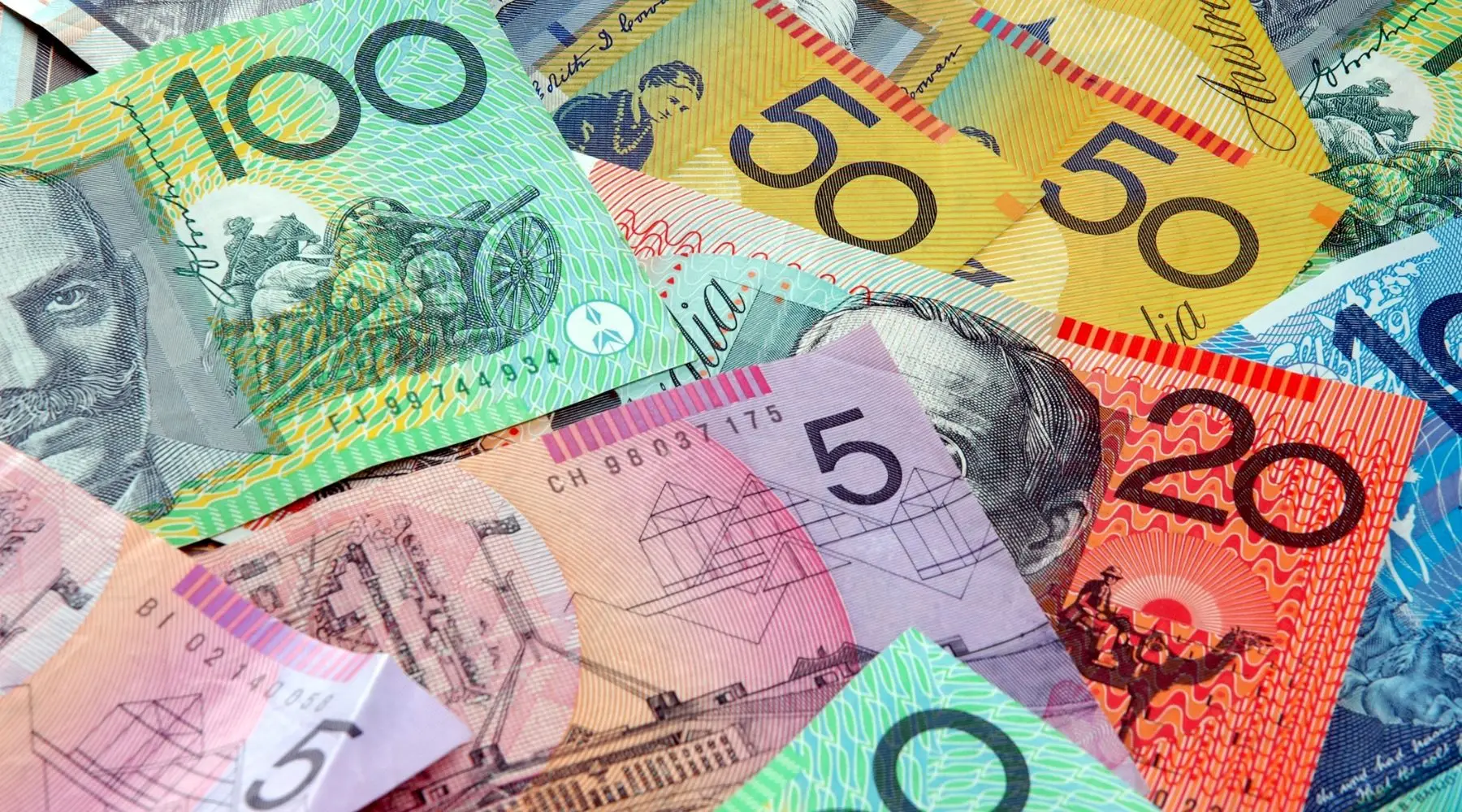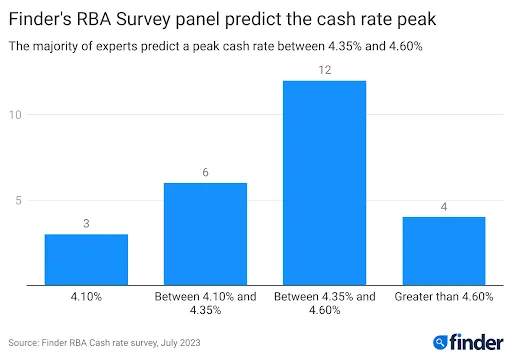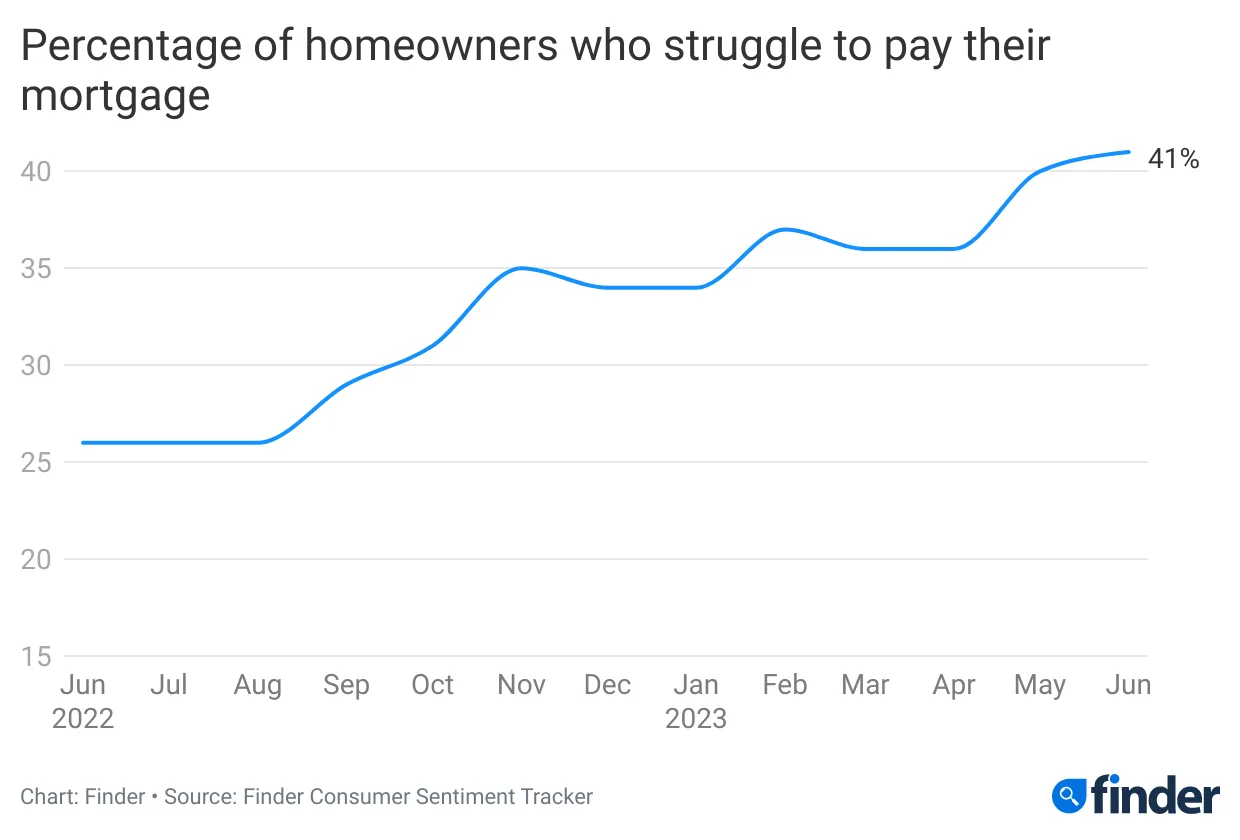Finder’s RBA survey: Experts divided on cash rate decision, households in mortgage prison expected to grow

The country's experts are almost evenly split on whether the RBA will lift the cash rate again in July.
In this month's Finder RBA Cash Rate Survey™, 39 experts and economists weighed in on future cash rate moves and other issues relating to the state of the economy.
A very slim majority of panellists (51%, 20/39) believe the RBA will increase the cash rate in July, leaving 49% (19/39) forecasting a hold.
Of those predicting a hike, almost all (18/39, 46%) are anticipating a rate rise of 25 basis points – bringing it to 4.35% in July.
Graham Cooke, head of consumer research at Finder, said it was another divided outcome from the panel.
"The latest ABS figures show that inflation has dropped again – a potentially strong case for the RBA to pause its series of recent hikes.
"While homeowners are calling for relief, our panel is evenly divided on what the RBA will do for a third straight month."
Panellists predicting a cash rate increase cited inflation still being persistently above the RBA's target, low unemployment and the fear of a wage-price spiral as the main factors.
Dr Andrew Wilson from My Housing Market said the stubbornly strong and strengthening labour market was seemingly unaffected by rate rises over the past year.
"Underlying inflation is still too high and significantly above target range. Responsible inflation-fighting policy demands more rate increases," Dr Wilson said.
Nalini Prasad from UNSW Sydney said while inflation has slowed, it nevertheless remains high.
"Inflation is higher than the cash rate. Of particular concern is services inflation which primarily reflects labour costs.
"To bring this down, the RBA will need to increase interest rates," Prasad said.
However, panellists predicting a hold cited the decrease in the recent inflation numbers as an encouraging sign which would push the RBA to pause.
Mathew Tiller from LJ Hooker Group noted, "The latest data shows that inflation continues to fall. This should see the RBA hold and monitor the effect of the most recent rate rises on the economy."
Beyond July, more than 1 in 2 panellists (56%, 22/39) believe the RBA will increase the cash rate in August.

The floodgates are likely to open on distressed home sales
A whopping 41% of Aussie mortgage holders – equivalent to 1.35 million households – admit they struggled to pay their home loan in June, according to Finder's Consumer Sentiment Tracker.
This is the highest proportion recorded since Finder began tracking the question in 2019.
2 in 3 experts who weighed in* (67%, 18/27) forecast that if the cash rate increases again in the second half of the year, more people will be forced to sell their homes because they can't service their mortgage.
APRA data shows mortgage defaults have increased to $15 billion worth of home loans in March 2023.
Given this, the panel on average forecast that if the cash rate rises to 4.80%, mortgage defaults would go beyond the recent peak of $20 billion in June 2020.
Cooke said millions of homeowners were already at the end of their tether.
"Many are facing the distressing prospect of defaulting on their loans and potentially losing their homes.
"A cash rate of 4.80% would likely open the floodgates," Cooke said.
Evgenia Dechter from UNSW Sydney said we haven't yet seen the full impact of the recent rate increases on households.
"The default rate may still increase [even if the cash rate is held]," Dechter said.
Mark Crosby from Monash University agreed.
"As more borrowers move out of fixed rate loans we are likely to see further mortgage distress," Crosby said.

Australia could fall into a recession
With New Zealand officially in a technical recession after 2 consecutive quarters of negative GDP growth, more than half of experts (57%, 16/28) say that Australia is in danger of falling into a recession by the end of 2023.
Household savings as a ratio of net disposable income dropped to 3.7% in the March quarter of 2023. This is the lowest since June 2008.
More than 1 in 2 panellists (59%, 16/27) said they were concerned that Australians were eroding their savings safety net.
Finder's Consumer Sentiment Tracker shows the average Aussie had $31,075 in cash savings in June.
Despite this, more than half (51%) say they could only live off their savings for a month or less if they lost their job tomorrow. A quarter (24%) say they could only live off their savings for a week or less – highlighting the disparity between the haves and the have-nots.
Shane Oliver from AMP noted, "The plunge in the saving rate indicates Australians are eroding their saving buffers in response to rate hikes and falling real wages."
Dale Gillham from Wealth Within said prior to the last few years of COVID and rising interest rates, Australians were accumulating more debt than ever before.
"Things have not really changed. The average Australian can't live without an income stream for more than a few weeks and this is disturbing.
"So what little savings net they have now is not significant enough and this has been concerning me for quite some time," Gillham said.
*Experts are not required to answer every question in the survey
Here's what our experts had to say:
Mathew Tiller, LJ Hooker Group (Hold): "Latest data shows that inflation continues to fall. This should see the RBA hold and monitor the effect of the most recent rate rises on the economy."
Stephen Miller, GSFM (Hold): "Australia has stubborn inflation and a set of wage arrangements inimical to its containment. The RBA still needs to 'chop a lot of wood' to get ahead of inflation."
Jonathan Chancellor, The Daily Telegraph (Hold): "The RBA can afford to hold again as its private research behind the publicly available data must be showing that the economy is contracting as it sought it to do."
Noel Whittaker, QUT Business School (Hold): "It's a line ball but the RBA copped so much flack lately. I think they might pause – Michelle Bullock has said recently they are aware of lead times. But more rate rises in the future for sure"
Harry Murphy Cruise, Moody's Analytics (Hold): "The economy is in a tug-of-war. On one side, price rises are pulling cost-of-living pressures higher. On the other, the Reserve Bank of Australia is hiking rates more aggressively than at any point in its history. Households and businesses are caught in the middle. As it stands, the RBA has its nose ahead in the contest. The economy is slowing, spending is going sideways, and firms are cutting their hiring plans. All that is helping to bring down inflation. But the RBA isn't willing to take any chances. The board struck a notably hawkish tone at its June meeting, flagging that more rate hikes are a distinct possibility. With data since then showing unemployment dropped back to 3.6% in May, additional tightening is likely. We expect one further rate hike in coming months, taking the cash rate to 4.35%."
Shane Oliver, AMP (Hold): "A +0.25% hike in July or August is a close call. The bigger than expected fall in inflation in May gives the RBA scope to pause in July to better allow for the lagged impact of past rate hikes, but still too high underlying inflation and worries about wages growth point to a further increase in rates in the months ahead."
Jeffrey Sheen, Macquarie University (Hold): "The probability has significantly increased of the economy slowing down (and maybe experiencing a recession) by the end of 2023. Since monetary policy has long lags, now is the time to stop raising the cash rate. Inflation appears to have peaked with the monthly headline rate in April down to 5.8%."
Evgenia Dechter, UNSW Sydney (Hold): "The decline in monthly CPI, the sluggish growth, as well as other indicators, suggest that the RBA should pause. Given that we haven't yet seen all the impacts of the recent monetary policy on the economy as it passes through with a delay, the RBA should tread slowly to assess the full effects."
Tim Nelson, Griffith University (Hold): "Rate of change in relation to inflation is falling. As such, the previous tightening appears to be starting to have an impact. The RBA is likely to wait to see how further impacts manifest."
Rich Harvey, Propertybuyer (Hold): "With inflation now trending in the right direction downwards and the hip pocket nerve of consumers finally feeling the pinch, it is likely the RBA will pause this month for breath before raising it again in August."
Michael Yardney, Metropole Property Strategists (Hold): "The fall in the May monthly CPI figure as well as other signs that our economy is slowing down should give the RBA room to keep the cash rate on hold this month at 4.10%. However, it would not reduce the likelihood of 1–2 more interest rate rises in coming months."
Cameron Kusher, REA Group (Hold): "Encouragingly both headline and underlying measures of inflation slowed in May which I believe will give the RBA enough of a reason to pause this month. Noting that next month's quarterly inflation may still give them enough of a reason to lift rates again."
James Morley, The University of Sydney (Hold): "The lower than expected year-on-year inflation for April will provide cover for the RBA to hold at this meeting. If the Q2 number comes in high in late July, they will raise at the next meeting. Then I think they will hold for a few months, especially if conditions deteriorate given past increases. There is some chance they will cut by the end of the year if the economy goes into recession, although I think there is still a bit less than 50% chance of this happening this year."
Anthony Waldron, Mortgage Choice (Hold): "We saw a meaningful slowdown in inflation in May, with Australian Bureau of Statistics data showing the smallest annual increase in inflation since April last year, so I expect to see the Reserve Bank hold the cash rate steady in July."
Stephen Halmarick, Commonwealth Bank (Hold): "To help control inflation."
Nicholas Gruen, Lateral Economics (Hold): "It's line ball this month. I think the Bank may pause as economic conditions tighten."
Garry Barrett, University of Sydney (Hold): "Inflation persistently well above target range."
Jakob Madsen, University of Western Australia (Hold): "RBA wants the increase to be gradual."
Nalini Prasad, UNSW Sydney (Increase): "While inflation has slowed, it nevertheless remains high. Inflation is higher than the cash rate. Of particular concern is services inflation which primarily reflects labour costs. To bring this down the RBA will need to increase interest rates."
Dr Andrew Wilson, My Housing Market (Increase): "Stubbornly strong and strengthening labour market unaffected by rate rises over past year. Underlying inflation is still too high and significantly above target range. Responsible inflation-fighting policy demands more rate increases."
Tomasz Wozniak, University of Melbourne (Increase): "Despite the lower reading of monthly inflation in June at 5.3%, my forecasts tell the same story as last month. They indicate a 15 basis point rise in the cash rate, with further increases expected throughout the year. The narrow forecast interval, spanning the values from 4.16–4.34%, leaves little doubt about the projected raises."
Matthew Greenwood, University of Melbourne (Increase): "The latest inflation data came in lower than expected, but that outcome was mostly driven by fuel prices. Underlying inflation is still stubbornly high. That will be a concern for the RBA Board, which has signalled its intent to keep a lid on inflation expectations. Coupled with a strong labour market and low productivity growth, this points to a further tightening of monetary policy."
Stella Huangfu, University of Sydney (Increase): "It is clear from the CPI data released today that inflation in AU has started declining. However, with a 5.6% CPI inflation during the year up to May 2023, the RBA still needs to increase the cash rate further."
Sean Langcake, Oxford Economics Australia (Increase): "The RBA are justifiably concerned about the outlook for unit labour costs. With wage growth yet to peak and productivity growth underwhelming, upward pressure remains on services inflation. International experience shows how persistent and hard to rein in inflation can be in these components. July will be a line ball decision as there is relatively little new data. But we expect to see 2 more hikes by September."
David Robertson, Bendigo Bank (Increase): "The lower read on monthly CPI does open the door for a pause in RBA rate hikes, however in another close decision the official cash rate will probably still increase in July as the RBA continues its focus on core services inflation."
Malcolm Wood, Ord Minnett (Increase): "RBA guarding against a wage-price spiral spiral."
Geoffrey Harold Kingston, Macquarie University Business School (Hold): "According to reports, 3 of the Bank's board are runners for the new Governor position, which will be decided next month. Also, the May CPI was lower than expected."
Mala Raghavan, University of Tasmania (Increase): "Despite the inflation rate of 5.6%, which is lower than previous recordings, it remains significantly higher than the desired target range of 2–3%. A closer look at the CPI figures provided by the ABS reveals that 2 essential household categories continue to exhibit high prices. Housing costs remain at a high level of approximately 8.4%, while food and non-alcoholic beverages have increased by 7.9%, thereby impacting the overall cost of living index related to housing. The declining trend of the overall inflation figure indicates that previous cash rate hikes have effectively helped curb inflation. Consequently, the RBA should consider implementing 1 or 2 additional rate hikes to restore inflation to its target level."
Tina Teng, CMC Markets (Increase): "Inflation is well above the 2% target, while labour market stays tight, putting upside pressure on consumer prices. Consumer spending saw softening, suggesting demand weakens."
Leanne Pilkington, Laing+Simmons (Increase): "It was apparently a close run decision last month so while many will feel leaving rates on hold is warranted this time around, the RBA appears intent on at least 1 more increase to curb inflation, despite the looming risk of recession."
Mark Crosby, Monash University (Increase): "Inflation remains elevated, and still the need for 2 more rate rises."
Peter Boehm, Pathfinder Consulting (Increase): "The RBA has no option but to increase interest rates – and I suspect rates will be at least 0.5% higher over the coming months, than they are today. This is because inflation is still high and the Federal Government budget is on balance, inflationary. So you have fiscal policy going one way and monetary policy going the other – no wonder the economy is in such a mess. Plus, with central banks like the Bank of England increasing interest rates, the RBA has no option but to follow suit otherwise we'll see the inflationary impacts of a devaluing AUD. And it seems almost inevitable Australia will enter a recession, hopefully a shallow one, but a recession nonetheless. This will probably be the only way to get inflation under control since the RBA and Federal Government policies appear to be at odds with one another."
Tim Reardon, Housing Industry Association (Increase): "Because the CPI will remain well above 3%."
A/Prof Mark Melatos, School of Economics, University of Sydney (Increase): "Inflation, especially the trimmed mean of the CPI, remains significantly above the RBA's target band. The RBA is still in catch-up mode with respect to matching their cash rate settings to the inflation reality. The RBA currently seems particularly concerned about services inflation and potential wage increases unaccompanied by productivity gains."
Brodie Haupt, WLTH (Increase): "Inflation is not in the 2–3% target range and the labour market remains tight with unemployment around the 3.5% mark."
Dale Gillham, Wealth within (Increase): "The slight increase in CPI last month was not in line with expectations and so I think the RBA will want to ensure they have inflation under control before easing off."
Craig Emerson, Emerson Economics (Increase): "The RBA Deputy Governor has said in a speech that the RBA needs to increase the unemployment rate to 4.5%."
Nicholas Frappell, ABC Refinery (Increase): "Persistent inflation coupled with tight labour market and concerns that wages and prices become 'indexed' and therefore stickier."
Alan Oster, Nab (Increase): "RBA very focussed on inflation. Not so much the economy now."
Ask a question
